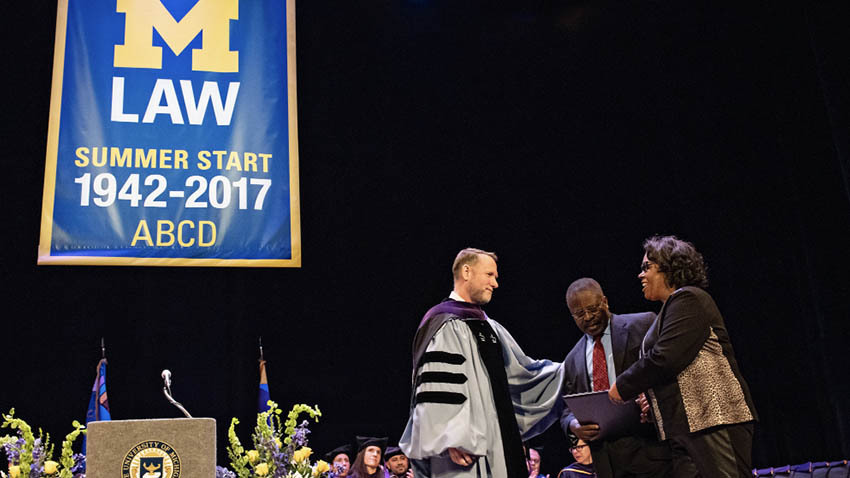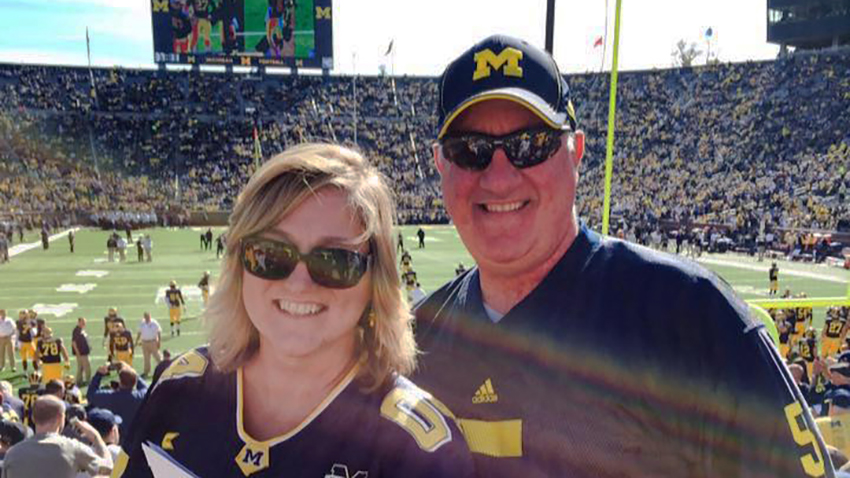A Chance to Speak Her Name: Tara Ogunde
A family remembers their daughter, a U-M Law School student who died in 2019 of breast cancer.

Alone and together, family members who had lost loved ones stepped to the front of the room and selected a leaf of remembrance from the branches of a potted tree.
很快Ogundes的转折。他们前往耶鲁大学管理学院e 450 miles from Landenberg, Penn., to attend the ceremony, to select a leaf, and to speak the name of their daughter: Tara Folashade Ogunde.
“We wouldn’t have missed it for anything,” Tara’s mother, Angela, says a few weeks after she and her husband, Kunle, participated in the University of Michigan Rogel Cancer Center’s annual memorial.
Tara died June 7 from triple-negative breast cancer. She was 31 and headed into her final year of law school at U-M, where she excelled.
Before she got sick, Tara was an associate editor of theMichigan Law Reviewand had lined up an internship at the prestigious Davis Polk law firm in New York City.
Her parents will accept Tara’s posthumously awarded law diploma at a graduation ceremony in Ann Arbor on December 20.

From symptoms to diagnosis
Six years after graduating magna cum laude from the University of Pittsburgh with an undergraduate degree in business administration, Tara started law school at U-M — her father’s alma mater. In the years between college and law school, Tara served in the AmeriCorps program, worked at several corporate jobs and traveled the world.
“Coming back to the campus with her, I was such a proud father,” says Kunle, who earned his B.S.E. in Aerospace Engineering and Chemical Engineering in 1978.
During her first semester at U-M, around Thanksgiving 2016, Tara started experiencing pain in her left breast, her mother says. A chest X-ray ordered by the student health service didn’t turn up anything and she finished out the rest of the school year without seeking further treatment.
LISTEN UP: Add theMichigan Medicine News Breakto your Alexa-enabled device, orsubscribe to our daily updates oniTunes,Google PlayandStitcher.
“When she came home in the summer, she asked me if I felt a lump in her left breast. And I did,” Angela says. “We made an appointment for the next day.”
On July 6, they got a definitive diagnosis: Breast cancer.
Triple-negative breast cancer, to be more specific — so named for its lack of estrogen receptors, progesterone receptors, and human epidermal growth factor 2 receptors. Triple negative breast cancer tends to be aggressive and, due to the lack of these receptors, has been difficult to develop effective therapies against.

In the U.S.,the incidence of triple negative breast cancer is much higher among black women, like Tara, than white women, contributing to lower overall breast cancer survival rates among black patients. (InTara’s obituary, the Ogundes requested donations to support research into triple-negative breast cancer in lieu of flowers.)
“It was definitely a shock,” Angela says. “There was no family history [of the disease].”
Tara also didn’t carry a defect in herBRCA1gene, she says. The gene is the one most frequently mutated in triple-negative breast cancer patients, andmutations are more common in African American patientsthan white patients.
Determined to continue
Tara took a year off from law school to pursue treatments at Penn Medicine, the University of Pennsylvania's health care system, which included a mastectomy of her left breast, chemotherapy and radiation.
She returned to U-M in the fall of 2018. But Tara’s cancer had spread to her lungs and pancreas, for which she received additional treatment at theU-M Rogel Cancer Center.
By November, she and her family decided it would be best if she returned to Pennsylvania, where her longtime oncologists were located. The law school allowed her to finish out the semester remotely.

“Even when she was in the hospital, she was on the phone with her professors, she was on the phone with Dean [Bayrex] Martí, finding out what work she needed to do and giving them updates,” Angela says.
Martí, the Law School’s assistant dean for student life, recalls how, as she navigated her treatment, Tara only became more determined.
“Earning a law degree, especially a Michigan Law degree, meant so much to her,” he says. “She would resist any adjustments to degree requirements or academic expectations. She wanted to meet the same thresholds her fellow students were expected to meet. I highly doubt I will ever meet someone who was so focused, so dedicated. She was humble yet persistent, flexible but assured. Only her best qualities came out during the worst stages of her cancer.”
Kunle adds, “Even though she was in the hospital and receiving treatment, she was determined to keep going right up until the very end.”
Remembered for her passion
From a young age, Tara wanted to make the world a better place. She was passionate about justice for the downtrodden, the voiceless and the invisible — and saw a law degree as a practical step toward making a difference, her father says. She was keenly interested in issues like human trafficking and racial disparities in policing.
As a future crusading lawyer, Tara wasn’t following in anyone’s footsteps, per se — dad’s an engineer and mom an educator — “but back in Nigeria, when I didn’t think I was going to be working in America this late in my life, I had dreams of influencing that society, of making things better,” Kunle says. “So, I saw in her, somebody who would actually do the things I dreamed of doing.”
Chelsea Ogunde, one of Tara’s two sisters, says, “She was one of the smartest people I ever met. I really looked up to her.”
MORE FROM MICHIGAN: Sign up for our weekly newsletter
Michigan ties endure
Both parents said they were amazed and grateful to have had so many professors and law school peers from U-M attend her funeral in Pennsylvania.
‘It just shows what an impact she had on people,” her mother notes. “It was wonderful.”
Martí remembers Tara as special member of their community — one who awed faculty, students and staff with her intellect and work ethic.
“She was a meaningful contributor to class discussions, and her writing and analysis stood out among her peers,” Martí says. “We were also touched by her kindness and attention. Her laughter was infectious, unforgettable. She went out of her way to mentor newer students and to make genuine connections with others.”
And even though the U-M Rogel Cancer Center played a smaller role in the overall treatment of Tara’s cancer, her parents “didn’t even have to think about” attending theannual memorial ceremonyon Nov. 10.
The event is an opportunity to invite families back into the “environment of care” after the abrupt loss of connection that happens when a patient dies, says Donna Murphy, LMSW, director of thePatient and Families Support Services Program

“Patients and families build relationships with doctors, nurses and staff over months and even years,” Murphy says. “But families and care givers don’t always get a chance to say good bye, or thank you, or share how frustrated all of us are when cancer gets the upper hand.”
The memorial — which includes talks, music, readings and a display of photos and mementos — is also an opportunity for families to come together with each other, and to experience how they are not alone in their journeys with cancer, Murphy adds.
The event, which just marked its 22nd year, is also open to cancer center caregivers, allowing them a rare opportunity to continue a connection that’s often lost when a patient dies.
“Oncologists are usually focused on the individual patient, so the memorial is an opportunity to pay respects and share the experience with the people who knew the patient best — their family,” says physicianDavid C. Smith, M.D., a professor of hematology/oncology and urology at Michigan Medicine, who also attended this year’s memorial.
Angela Ogunde says her family wasn’t sure what to expect from the memorial.
“我有很多担忧回到campus — the last time we were there, we were moving her out of the Lawyer’s Club,” she says “But I’ll tell you what, that ceremony was so comforting — I don’t know how to explain it; being able to be included, being able to get up there with the other families and say Tara’s name, it really meant so much to us.”





